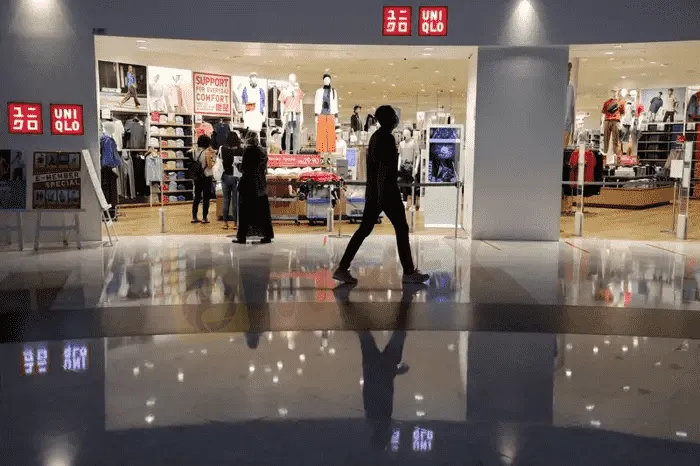简体中文
繁體中文
English
Pусский
日本語
ภาษาไทย
Tiếng Việt
Bahasa Indonesia
Español
हिन्दी
Filippiiniläinen
Français
Deutsch
Português
Türkçe
한국어
العربية
Uniqlo owner’s Q3 results to offer clues on China recovery, Japan inflation
Abstract:Japan’s Fast Retailing, home of Uniqlo, is expected to report quarterly profit grew 11% overall on Thursday, but investors’ focus will be on whether China is recovering and how domestic consumers are faring with inflation and the weak yen.

A bellwether for global retailers operating in China, Fast Retailing previously warned of a sharp decline in profit this year from its nearly 900 stores in the worlds no.2 economy. Still, it raised overall sales and profit forecasts to reflect strong demand in North America and Europe.
On Thursday, the company is expected to post an operating profit of 66.72 billion yen ($487 million) for its fiscal third quarter through May, according to an average of seven analysts forecasts from Refinitiv.
For the year ending August, the company expects earnings to climb 8.4% to 270 billion yen.
Uniqlo, known for affordable basics like socks and t-shirts, is popular in China and has not disavowed the use of Xinjiang cotton, unlike rivals including H&M, after allegations of forced labour in the region emerged in recent years.
“We believe the worst is behind us in China and this current quarter is ‘as bad as it gets’,” wrote Mark Chadwick, an analyst who publishes on the Smartkarma research platform.
Meanwhile, the U.S. market is projected to turn a profit for the first time, he added.
Results last week by Japanese retail giants Ryohin Keikaku Co, home of the Muji brand, and 7-Eleven convenience store owner Seven & i Holdings Co showed the diverging trends of major overseas markets.
Ryohin Keikaku reduced full-year forecasts, citing an uncertain outlook for mainland China. But Seven & i, which also runs Speedway convenience stores in the United States, lifted annual earnings estimates as the yen‘s decline to a 24-year low against the dollar boosts the value in Japanese currency terms of sales booked in the world’s biggest economy.
In Japan, meanwhile, the yens drop is adding to production costs and inflation. Fast Retailing chief executive Tadashi Yanai has railed that there is “absolutely no merit” to a weak yen.
The company said last month it would increase prices on its popular fleeces this autumn and warned that more hikes could be on the horizon.

Disclaimer:
The views in this article only represent the author's personal views, and do not constitute investment advice on this platform. This platform does not guarantee the accuracy, completeness and timeliness of the information in the article, and will not be liable for any loss caused by the use of or reliance on the information in the article.
Read more

WikiEXPO Dubai 2024 is coming soon
3 Days Left!

Trader Exposes Unethical Practices by STP Trading
A recent allegation against STP Trading has cast doubt on the firm's business practices, highlighting the potential risks faced by retail traders in an increasingly crowded and competitive market.

What Makes Cross-Border Payments Easier Than Ever?
Cross-border payments are now faster, cheaper, and simpler! Explore fintech, blockchain, and smart solutions to overcome costs, delays, and global payment hurdles.

WikiEXPO Dubai 2024 is set to open!
4 Days Left
WikiFX Broker
Latest News
eToro Expands Nationwide Access with New York Launch
Webull Partners with Coinbase to Offer Crypto Futures
Why Is UK Inflation Rising Again Despite Recent Lows?
Hackers Charged for $11M Crypto Theft Using SIM-Swaps
Role of Central Banks in the FX Market
FCA Alerts Against Sydney FX
What Makes Cross-Border Payments Easier Than Ever?
Trader Exposes Unethical Practices by STP Trading
Interactive Brokers Launches Tax-Friendly PEA Accounts in France
Google Warns of New Deepfake Scams and Crypto Fraud
Currency Calculator


